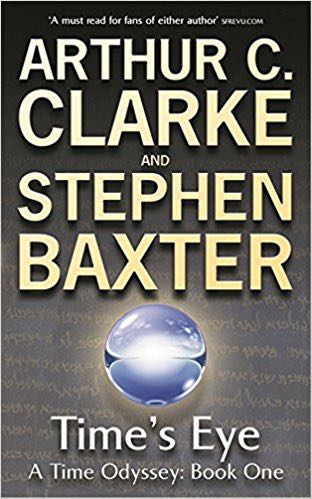Time's Eye
Reviewed date: 2007 Mar 10
Rating: 3
364 pages
As a rule I stay away from collaborative novels, but I gave Time's Eye a try. The story begins when a 21st century UN helicopter crashes in Afghanistan. On the ground the crew meets 19th century British forces from Ft. Jamrud.
The earth has been fractured into millions of time slices. Someone has taken wedges of Earth from different times and stitched them together into a new planet. The time periods of the wedges cover the whole of human history.
After the time-shattering Discontinuity, the world's population centers and civilizations are gone. Only two significant forces are left intact: Alexander the Great's army, and Genghis Khan's Mongol Empire. It soon becomes clear that the answers to the riddle of the Discontinuity are in Babylon. Alexander and Genghis Khan both make their way to Babylon. Each are aided by a few survivors from the 21st century, who appear to be the most advanced people around--there is no one from a later time period.
The first two thirds of the book work toward the climactic battle between Alexander the Great and Genghis Khan. Unfortunately, Genghis Khan vs. Alexander is Bambi meets Godzilla. The battle is anticlimactic and lacks drama. At no time does Genghis Khan stand a chance of winning. To make a better story, Clarke and Baxter should have handicapped Alexander somehow: for example, only have part of his army survive the Discontinuity.
The last third of the novel investigates the mystery of the Discontinuity, and the novel ends by revealing absolutely nothing. It's a setup: we have to read the sequel to figure out anything.
Clarke and Baxter wisely pepper the story with minor historical characters with whom modern readers can identify: most prominently, Rudyard Kipling. Unwisely, they choose to be dismissive and downright hostile to religion. The 19th century British rejoice when a 21st century UN peacekeeper explains that humanity is working to combine all religions, because "we understand why we need gods. ... By unifying [all] religions, the result won't be a dilution but an enrichment." And then there's the egregiously false comment about how "Darwin proved it was possible for organization to emerge from lifeless matter." Those are minor quibbles, but they mar the whole story.
Time's Eye wasn't a bad book, but I won't go out of my way to read the sequels.
